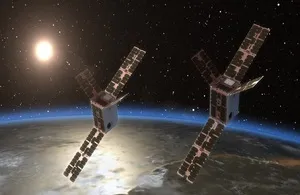This aims to both characterise the ionosphere (the ionised portion of Earth’s upper atmosphere) and capture image data to support Space Domain Awareness. The space debris company was selected by the UK Defence Science and Technology Laboratory (Dstl) to operate the mission.
Collaboration
The mission involves two CubeSat satellites observing and collecting data using in-situ and remote sensing techniques. They will be flying in formation, in Low Earth, Sun Synchronous Orbit.
Note that Astroscale will be working with Open Cosmos, Dragonfly Aerospace, the university of Bath, Surrey Satellite Technology and US Naval Research Laboratory.
Basically, OpenCosmos will design and build the two identical CubeSats. They will include payloads for Hyperspectral Imaging (HSI), which will be supplied by Dragonfly Aerospace. Payloads from the US Naval Research Laboratory will characterise the ionosphere.
Also, the University of Bath will be studying the differential phase of received GPS signals. And Surrey Satellite Technology will provide a Radiation Monitor. This comprises a particle detector, dose rate monitor and total dose monitor.
Orpheus
Astroscale itself highlighted the importance of winning a defence contract.
“The Dstl Orpheus mission is an important opportunity for Astroscale to demonstrate our capability to deliver innovative missions in the Defence arena and in support of national security,” said Nick Shave, Managing Director of Astroscale UK.
“We have successfully demonstrated our space mission implementation capability during our ELSA-d mission in 2021, and the ADRAS-J close proximity inspection mission in 2024. We are pleased to contribute our space mission design, development, integration and operations experience to ensure a successful mission which will also demonstrate the UK’s value to international partner nations.”
The satellites are due to launch in 2027 and the three year contract will conclude in 2028.
Space infrastructure
For its part, the Dstl highlighted the critical nature of space infrastructure.
“Changes in space weather can have a critical impact on satellites which provide navigation aids, telecommunications and data transmission,” said the Dstl Chief Executive, Dr Paul Hollinshead. “Sustained investment in space research in collaboration with our international partners strengthens the security of UK interests in space.”
The name Orpheus is after the poet of classical legend. Presumably the two satellites will be Orpheus and Eurydice.
Astroscale UK is a subsidiary of the Japan-based Astroscale.
Image: Dstl
See also: Underwater robot to improve pipeline and cable security

